
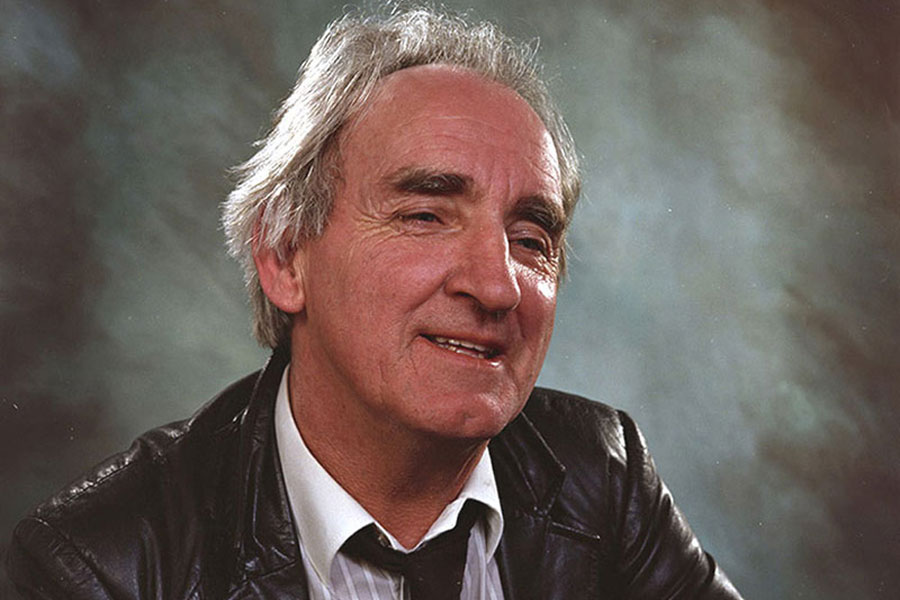
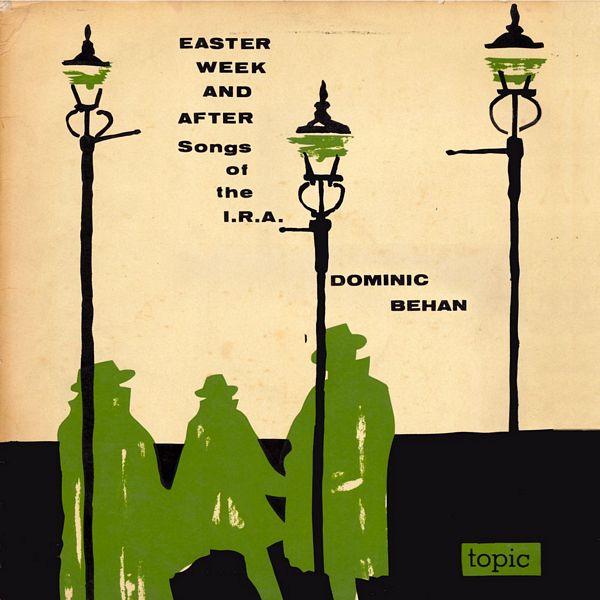 |
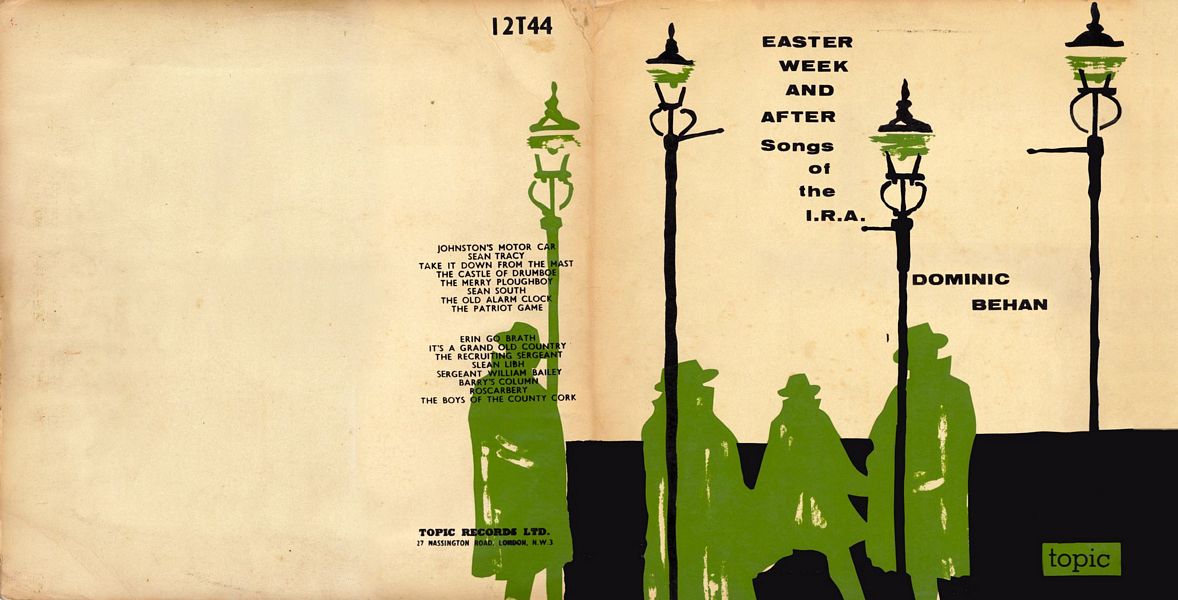
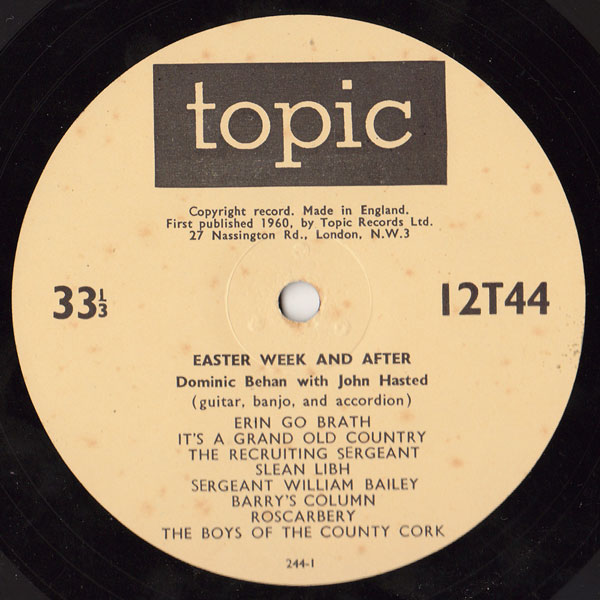
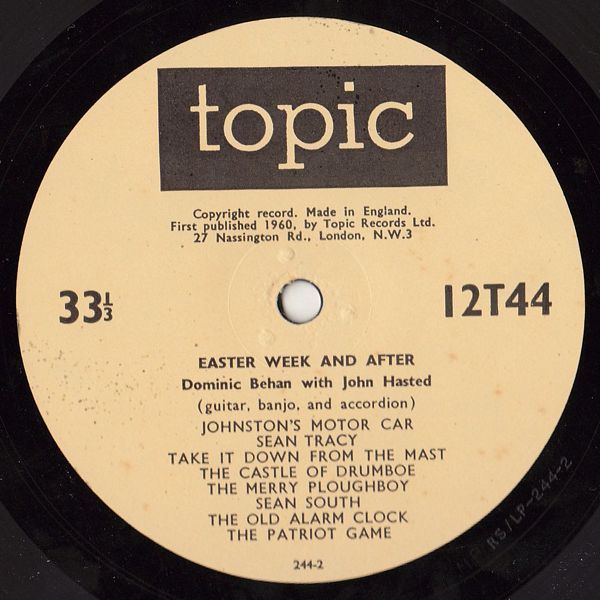 |
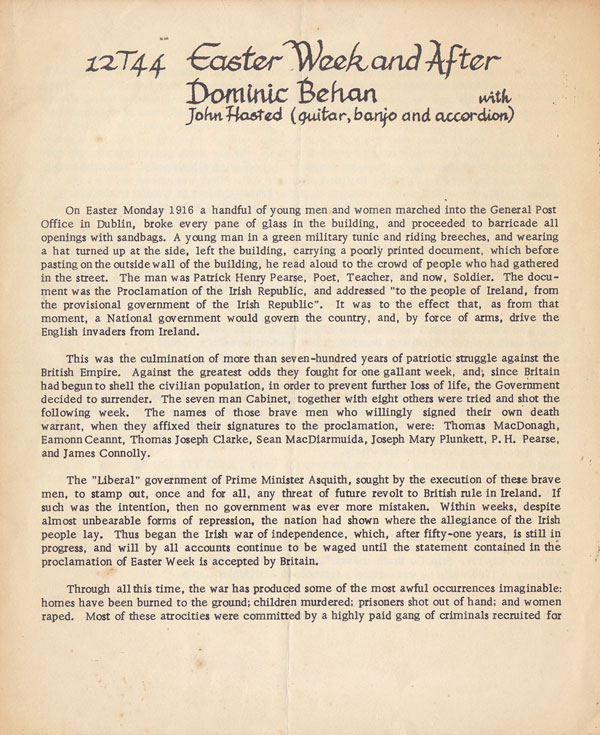
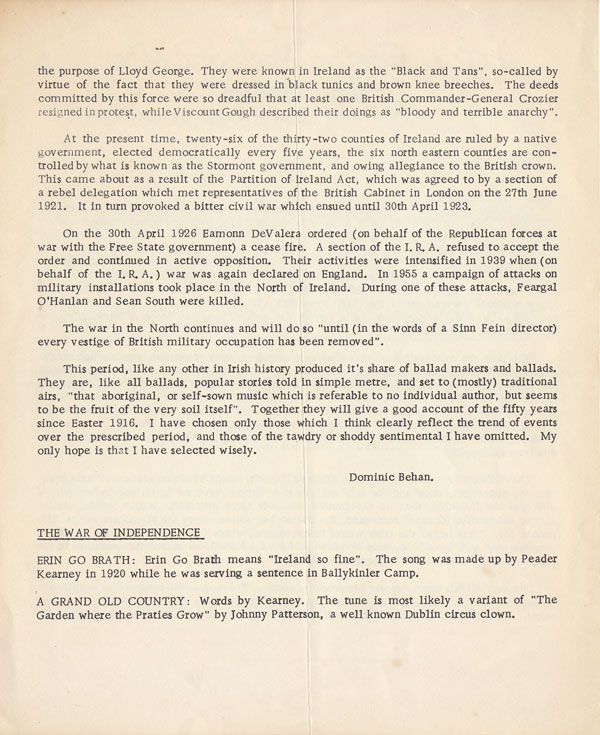
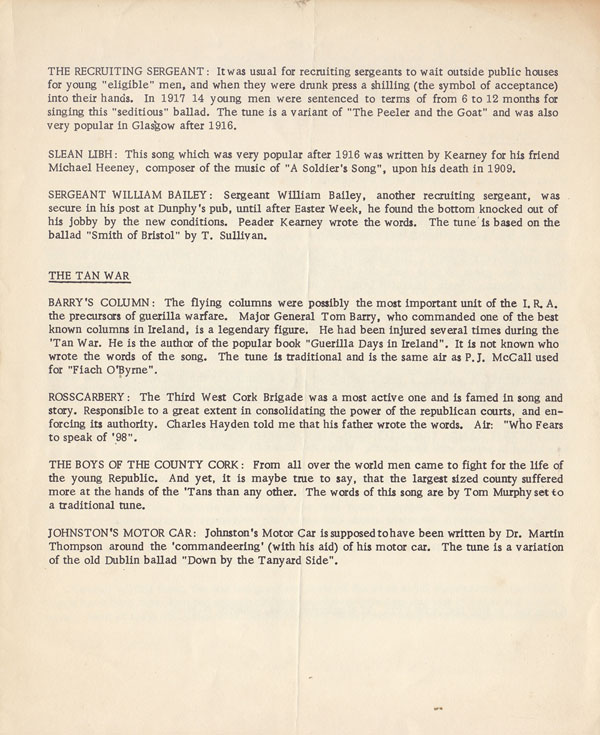
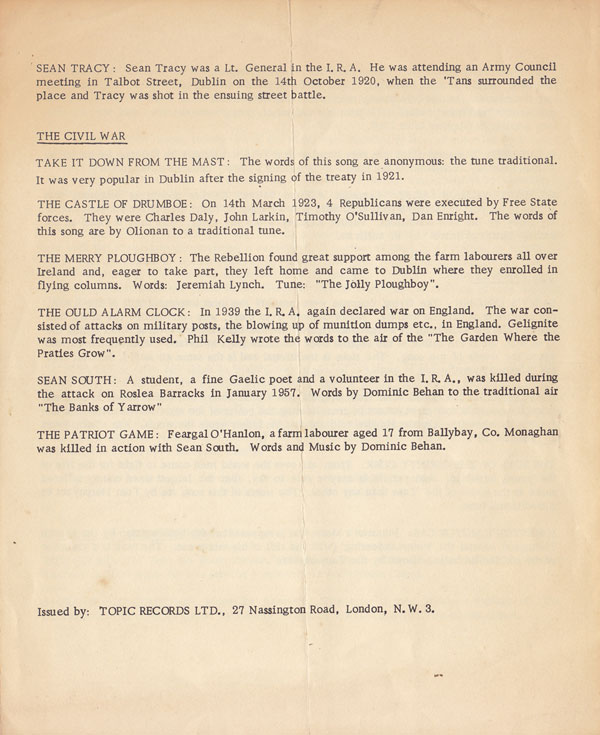 |
Sleeve Notes
On Easter Monday 1916 a handful of young men and women marched into the General Post Office in Dublin, broke every pane of glass in the building, and proceeded to barricade all openings with sandbags. A young man in a green military tunic and riding breeches, and wearing a hat turned up at the side, left the building, carrying a poorly printed document, which before pasting on the outside wall of the building, he read aloud to the crowd of people who had gathered in the street. The man was Patrick Henry Pearse, Poet, Teacher, and now, Soldier. The document was the Proclamation of the Irish Republic, and addressed "to the people of Ireland, from the provisional government of the Irish Republic". It was to the effect that, as from that moment, a National government would govern the country, and, by force of arms, drive the English invaders from Ireland.
This was the culmination of more than seven-hundred years of patriotic struggle against the British Empire. Against the greatest odds they fought for one gallant week, and, since Britain had begun to shell the civilian population, in order to prevent further loss of life, the Government decided to surrender. The seven man Cabinet, together with eight others were tried and shot the following week. The names of those brave men who willingly signed their own death warrant, when they affixed their signatures to the proclamation, were: Thomas MacDonagh, Eamonn Ceannt, Thomas Joseph Clarke, Seán MacDiarmuida, Joseph Mary Plunkett, P. H. Pearse, and James Connolly.
The "Liberal" government of Prime Minister Asquith, sought by the execution of these brave men, to stamp out, once and for all, any threat of future revolt to British rule in Ireland. If such was the intention, then no government was ever more mistaken. Within weeks, despite almost unbearable forms of repression, the nation had shown where the allegiance of the Irish people lay. Thus began the Irish war of independence, which, after fifty-one years, is still in progress, and will by all accounts continue to be waged until the statement contained in the proclamation of Easter Week is accepted by Britain.
Through all this time, the war has produced some of the most awful occurrences imaginable: homes have been burned to the ground; children murdered; prisoners shot out of hand; and women raped. Most of these atrocities were committedby a highly paid gang of criminals recruited for the purpose of Lloyd George. They were known in Ireland as the "Black and Tans", so-called by virtue of the fact that they were dressed in black tunics and brown knee breeches. The deeds committedby this force were so dreadful that at least one British Commander-General Crozier resigned in protest, while Viscount Gough described their doings as "bloody and terrible anarchy".
At the present time, twenty-six of the thirty-two counties of Ireland are ruled by a native government, elected democratically every five years, the six north eastern counties are controlled by what is known as the Stormont government, and owing allegiance to the British crown. This came about as a result of the Partition of Ireland Act, which was agreed to by a section of a rebel delegation which met representatives of the British Cabinet in London on the 27th June 1921. It in turn provoked a bitter civil war which ensued until 30th April 1923.
On the 30th April 1926 Eamonn DeValera ordered (on behalf of the Republican forces at war with the Free State government) a cease fire. A section of the I. R. A. refused to accept the order and continued in active opposition. Their activities were intensified in 1939 when (on behalf of the I. R. A.) war was again declared on England. In 1955 a campaign of attacks on military installations took place in the North of Ireland. During one of these attacks, Feargal O'Hanlan and Seán South were killed.
The war in the North continues and will do so "until (in the words of a Sinn Fein director) every vestige of British military occupation has been removed".
This period, like any other in Irish history produced it's share of ballad makers and ballads. They are, like all ballads, popular stories told in simple metre, and set to (mostly) traditional airs, "that aboriginal, or self-sown music which is referable to no individual author, but seems to be the fruit of the very soil itself". Together they will give a good account of the fifty years since Easter 1916. I have chosen only those which I think clearly reflect the trend of events over the prescribed period, and those of the tawdry or shoddy sentimental I have omitted. My only hope is that I have selected wisely.
Dominic Behan
THE WAR OF INDEPENDENCE
ERIN GO BRATH: Erin Go Brath means "Ireland so fine". The song was made up by Peader Kearney in 1920 while he was serving a sentence in Ballykinler Camp.
A GRAND OLD COUNTRY: Words by Kearney. The tune is most likely a variant of "The Garden where the Praties Grow" by Johnny Patterson, a well known Dublin circus clown.
THE RECRUITING SERGEANT: It was usual for recruiting sergeants to wait outside public houses for young "eligible" men, and when they were drunk press a shilling (the symbol of acceptance) into their hands. In 1917 14 young men were sentenced to terms of from 6 to 12 months for singing this "seditious" ballad. The tune is a variant of "The Peeler and the Goat" and was also very popular in Glasgow after 1916.
SLEAN LIBH: This song which was very popular after 1916 was written by Kearney for his friend Michael Heeney, composer of the music of "A Soldier's Song", upon his death in 1909.
SERGEANT WILLIAM BAILEY: Sergeant William Bailey, another recruiting sergeant, was secure in his post at Dunphy's pub, until after Easter Week, he found the bottom knocked out of his jobby by the new conditions. Peader Kearney wrote the words. The tune is based on the ballad "Smith of Bristol" by T. Sullivan.
THE TAN WAR
BARRY'S COLUMN: The flying columns were possibly the most important unit of the I. R, A. the precursors of guerilla warfare. Major General Tom Barry, who commanded one of the best known columns in Ireland, is a legendary figure. He had been injured several times during the 'Tan War. He is the author of the popular book "Guerilla Days in Ireland". It is not known who wrote the words of the song. The tune is traditional and Is the same air as P. J. McCall used for "Fiach O'Byrne".
ROSSCARBERY: The Third West Cork Brigade was a most active one and is famed in song and story. Responsible to a great extent in consolidating the power of the republican courts, and enforcing its authority. Charles Hayden told me that his father wrote the words. Air: "Who Fears to speak of '98".
THE BOYS OF THE COUNTY CORK: From all over the world men came to fight for the life of the young Republic. And yet, it is maybe true to say, that the largest sized county suffered more at the hands of the 'Tans than any other. The words of this song are by Tom Murphy set to a traditional tune.
JOHNSTON'S MOTOR CAR: Johnston's Motor Car is supposed to have been written by Dr. Martin Thompson around the 'commandeering' (with his aid) of his motor car. The tune is a variation of the old Dublin ballad "Down by the Tanyard Side".
Seán TRACY: Seán Tracy was a Lt. General in the I. R. A. He was attending an Army Council meeting in Talbot Street, Dublin on the 14th October 1920, when the 'Tans surrounded the place and Tracy was shot in the ensuing street battle.
THE CIVIL WAR
TAKE IT DOWN FROM THE MAST: The words of this song are anonymous: the tune traditional. It was very popular in Dublin after the signing of the treaty in 1921.
THE CASTLE OF DRUMBOE: On 14th March 1923, 4 Republicans were executed by Free State forces. They were Charles Daly, John Larkin, Timothy O'Sullivan, Dan Enright. The words of this song are by Olionan to a traditional tune.
THE MERRY PLOUGHBOY: The Rebellion found great support among the farm labourers all over Ireland and, eager to take part, they left home and came to Dublin where they enrolled in flying columns. Words: Jeremiah Lynch. Tune: "The Jolly Ploughboy".
THE OULD ALARM CLOCK: In 1939 the I. R. A. again declared war on England. The war consisted of attacks on military posts, the blowing up of munition dumps etc., in England. Gelignite was most frequently used. Phil Kelly wrote the words to the air of the "The Garden Where the Praties Grow".
Seán SOUTH: A student, a fine Gaelic poet and a volunteer in the I.R. A., was killed during the attack on Roslea Barracks in January 1957. Words by Dominic Behan to the traditional air "The Banks of Yarrow"
THE PATRIOT GAME: FeargalO'Hanlon, a farm labourer aged 17 from Ballybay, Co. Monaghan was killed in action with Seán South. Words and Music by Dominic Behan.
Issued by: TOPIC RECORDS LTD., 27 Nassington Road, London, N.W. 3.